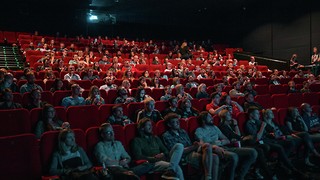Arts Comment
Amateur decision making – the limited ambition of Cambridge theatre.
In my spare-time, I make theatre posters. Usually, it’s quite a simple process. A friend asks me to put some publicity together; I draw something; I fiddle around on Photoshop. And then the poster gets emailed to the printers and appears several days later at a location near you. Happy days. My most recent project, though, didn’t go so swimmingly. The director liked it – sure. So too did the producer. But the theatre – one of the bigger ones in Cambridge – kicked up a right rumpus. My baby, they initially argued, just didn’t ‘look like a theatre poster.’ I was flabbergasted. Quite a knock to the ego, you can imagine. “The bastards don’t get it,” I railed to all who would listen, “simply because their idea of a good theatre poster involves some boring headshot of the latest jumped-up starlet.” What a diva, you’re probably thinking. And you’d probably be right.
But, diva-like though my reaction was, I’d also argue that the theatre’s attitude towards the poster is a worrying part of a wider homogeneity affecting Cambridge drama. It’s part of a conservative myopia that says plays in Cambridge must make money; that they must look good on their directors’ resumes; they must be from the literary canon; must be reviewed well in Varsity; must make their actors into big names. All of which makes Cambridge drama totally irrelevant. Plays here rarely say anything politically pertinent to our times, and theatrically seldom do anything particularly original. Good drama either scrutinises the contemporary or, if it must involve canonical texts, at least tries to radically reinvent them with revolutionary stagecraft. Cambridge drama, however, does little of this. Politically, it’s flaccid; there’s little new writing – and practically none from undergraduates. And in pure theatrical terms, productions are staid; physical or devised pieces, for example, are virtually unheard of.
Just look at the stats: of the fifty-odd plays performed in Cambridge this term, only two were devised pieces, and only eight were written in the last ten years. And of those eight, just five were written by students, and barely three of those strayed beyond comedy. Such is the paucity of new writing that the admirable Miscellaneous Festival – originally merely intended for the performance of unfinished cast-offs – has now become the flagship event for Cambridge playwrights. Such is the suspicion of devised theatre that Cambridge theatrical companies, directors tell me, give incredibly short shrift to applications involving unscripted work. And such is the monotonous reliance on Shakespeare that the University’s main three touring companies – CAST, ETG and the PPJT – and the Marlowe Society – a group which nominally exists to combat homogeneity in drama – never look beyond him for their annual productions.
Don’t get me wrong: it is an honour to be surrounded by so many talented actors and directors. And we’re lucky to be at a university which offers so many opportunities to watch, and to perform in, drama. I just wish, though, that more of those actors, and more of these dramatic opportunities, were concerned with saying something new and relevant, either politically or theatrically. At its best, theatre either explores fresh theatrical ideas or provides relevant analysis of modern society. Too often at Cambridge, however, it is just seen as a shortcut to celebrity, or a quick way of making money. Or a fast-track to having your face on a poster.
Patrick is the Guardian Student Journalist of the Year
 News / Tompkins Table 2025: Trinity widens gap on Christ’s19 August 2025
News / Tompkins Table 2025: Trinity widens gap on Christ’s19 August 2025 Comment / A plague on your new-build houses18 August 2025
Comment / A plague on your new-build houses18 August 2025 News / Trinity sells O2 Arena lease for £90m12 August 2025
News / Trinity sells O2 Arena lease for £90m12 August 2025 News / Pro-Palestine activists spray-paint Barclays Eagle Labs18 August 2025
News / Pro-Palestine activists spray-paint Barclays Eagle Labs18 August 2025 News / Uni welcomes new students14 August 2025
News / Uni welcomes new students14 August 2025









